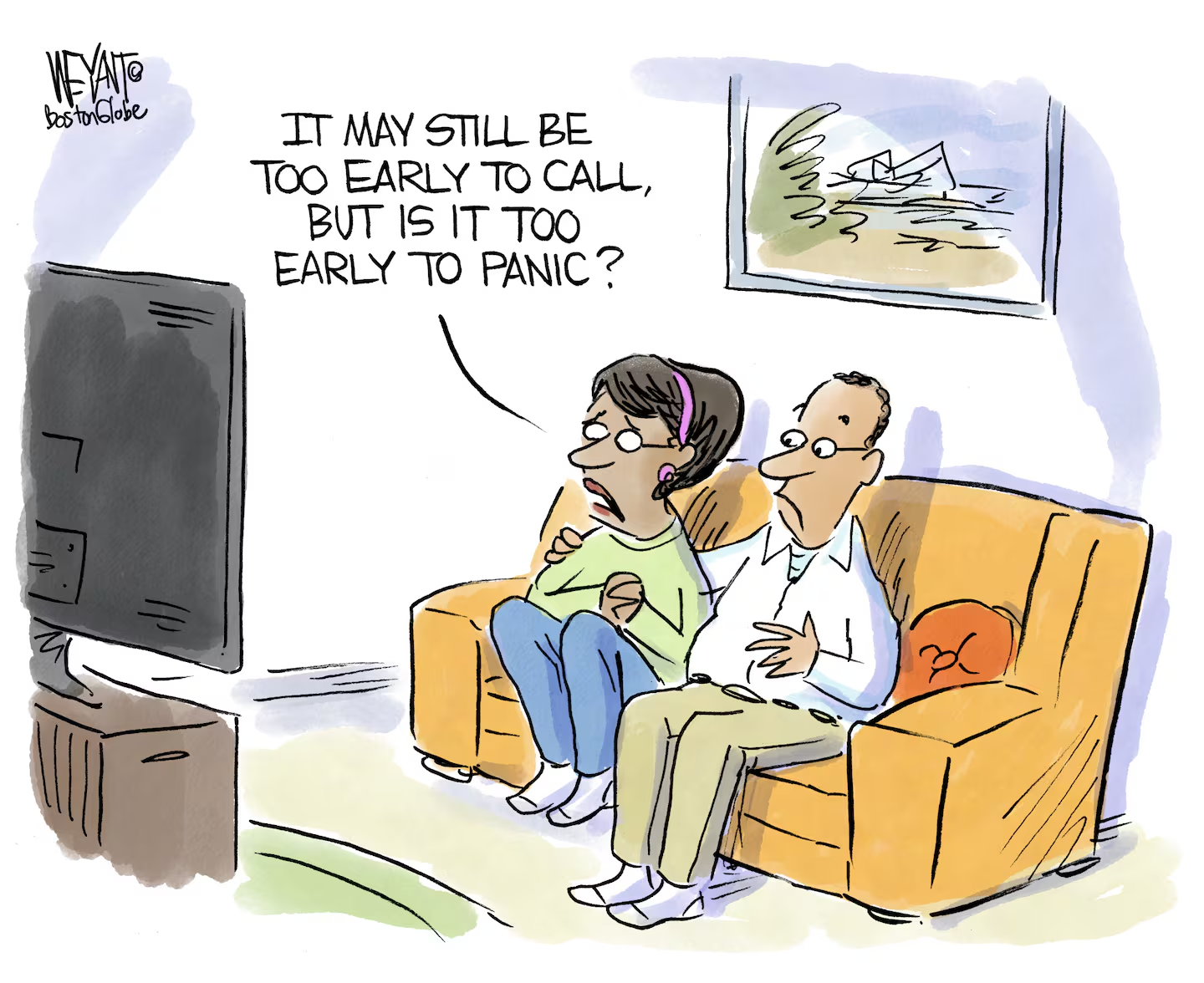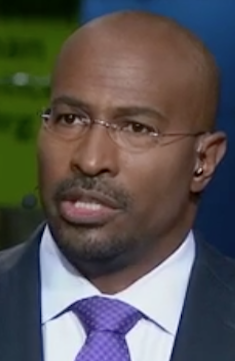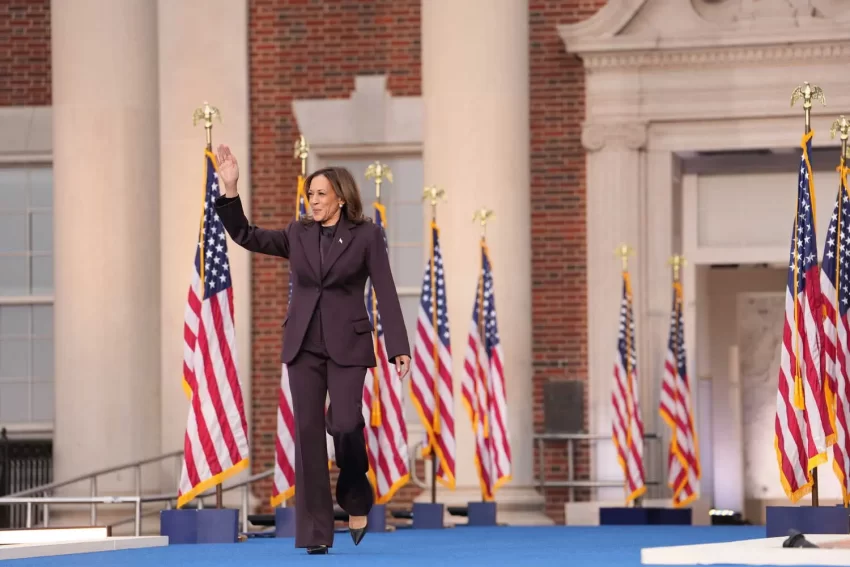Tapper, Wallace Say Other Issues Were Paramount
Election Night, as Seen by N.Y. Times Opinion Writers
‘Trump Wins, the Press Loses’
. . . Pressing Questions for the News Media
Multitalented Anchor Chauncy Glover Dies at 39
Donations are tax-deductible.

(Credit: Christopher Weyant/Boston Globe)
Tapper, Wallace Say Other Issues Were Paramount
In the wee hours of election night, as Donald Trump was just four electoral votes from clinching the presidency, CNN anchor Jake Tapper told viewers that “some see this as a vote for bigotry, misogyny, racism.” They are wrong, Tapper said.
 “The people who voted don’t like the county as it is right now,” Tapper (pictured) continued, they see “the prices at the gas pump and at the grocery store,” and immigration issues, “and also, what has been happening in the world.”
“The people who voted don’t like the county as it is right now,” Tapper (pictured) continued, they see “the prices at the gas pump and at the grocery store,” and immigration issues, “and also, what has been happening in the world.”
Tapper’s colleague Chris Wallace added that the gap between the college-educated and those without degrees indicates that this was a “class election.” Those in the working class saw themselves as being looked down upon.
How race fit into Trump’s victory, and how much attention the media gave it, should be part of the post-election discussion.
Some other commentators took a quite different view from Tapper and Wallace.
 “Let‘s be honest on this, okay,” said David Axelrod (pictured), former Barack Obama adviser, also on CNN. “Let’s be absolutely blunt about it. There were appeals to racism in this campaign, and there is racial bias in this country and there is sexism in this country, and anybody who thinks that that did not in any way impact on the outcome of this race is wrong.
“Let‘s be honest on this, okay,” said David Axelrod (pictured), former Barack Obama adviser, also on CNN. “Let’s be absolutely blunt about it. There were appeals to racism in this campaign, and there is racial bias in this country and there is sexism in this country, and anybody who thinks that that did not in any way impact on the outcome of this race is wrong.
“I am not saying that was the main reason that Kamala Harris lost and Donald Trump won. I think they ran, honestly, strategically, his campaign, I said many times, they ran a very smart campaign. It was ultimately a rational, well-conceived and well-executed campaign for an often irrational candidate, and they overcame him to sell his message or the message that they thought he should be selling to the country. But let‘s not confuse what this was and wasn‘t. Let‘s be very clear-eyed about it.”
 “CNN commentator Van Jones (pictured) responded somewhat to comments from David Urban, CNN contributor and former Trump adviser, who said that the Trump victory was a way for ‘regular people’ to tell the so-called ‘elite’ that they didn’t like being talked down to and that there needed to be a ‘reckoning’ that Trump isn’t so crazy with his ideas about the economy and border and so on,” Tom Jones noted for the Poynter Institute.
“CNN commentator Van Jones (pictured) responded somewhat to comments from David Urban, CNN contributor and former Trump adviser, who said that the Trump victory was a way for ‘regular people’ to tell the so-called ‘elite’ that they didn’t like being talked down to and that there needed to be a ‘reckoning’ that Trump isn’t so crazy with his ideas about the economy and border and so on,” Tom Jones noted for the Poynter Institute.
Jones responded with, “I’m thinking about the people who are not a part of anybody’s elite who are hurting tonight. There are African American women who know a little bit about being talked down to, and know a little bit about having their economic dreams crushed, who tried to dream a big dream the past couple months.
” ‘And tonight they’re trading in a lot of hope for a lot of hurt. They were hoping that, maybe, this time one of their own could be seen worthy. And, once again, they’re facing rejection. And that hurts. They thought tomorrow morning they’re going to walk out with their shoulders back a little bit. They’d be able to breathe for the first time. They feel like they belong someplace. They did everything they knew how to do. And it’s going to be harder than it should be for them to hold their heads up.’
“Jones also mentioned others who are suffering because of an apparent Trump victory, such as those in the trans community and immigrants.
“ ‘It’s people who woke up with a dream,’ Jones said, ‘and are going to bed with a nightmare.’ ”
CNN said it conducted exit polling interviews with thousands of voters, both those who cast a ballot on Election Day and those who voted early or absentee.
The network’s polling showed that Black people voted 85 percent for Harris vs. 13 percent for Trump; Asians 56 percent for Harris vs. 38 percent for Trump; Latinos 53 percent for Harris, 45 percent for Trump; whites 43 percent for Harris, 55 percent for Trump; and “others” 43 percent for Harris, 53 percent for Trump.
Commentators paid particular attention to the percentages for Latinos and for white women, suggesting they were voting against their own interests.
Despite the presence of a woman at the top of the Democratic ticket, a surge in female voter registration and reproductive rights as a major issue, white women did not break with history.
“Over the last 72 years, a plurality of white women have voted for the Democratic candidate in only two presidential elections – in 1964, when Lyndon Johnson won 44 states, and in 1996, when Bill Clinton ran in a three-way race,” according to the Guardian.
In Tuesday’s exit polls, 53 percent of white women and 55 percent of Latino men voted for Trump. However, according to NBC, white women with college degrees chose Harris, 57 percent to 41 percent. Only 35 percent of white female non-college graduates did; 63 percent went for Trump.
 Commenting Wednesday on the Latino polling figures on NPR, Evelyn Perez-Verdia (pictured) cited a disconnect between Latinos and others over the use of language.
Commenting Wednesday on the Latino polling figures on NPR, Evelyn Perez-Verdia (pictured) cited a disconnect between Latinos and others over the use of language.
The term “Latinx,” for example, is rejected by most Latinos, yet is used to address the group by some non-Latinos. “Progressive” is associated with socialism, and is also out of favor with many U.S. Latinos, she continued.
Moreover, said NPR correspondent Franco Ordoñez, “Trump’s team, his campaign told me, you know, that their data showed that many of the Latino voters that they were going after — the working-class Latino voters — were second- and third-generation voters, which they felt would vote — more likely vote like every other American in the country.
“So there’s so much, you know, that goes into this, and I think that’s something that they tapped into. But particularly, I do think the economy was a massive number. And Latinos had high percentage, and particularly the second and third generations had a big impact in states like Nevada and Arizona, and other — North Carolina, Georgia, for example.”
TV One streamed live election night coverage from Roland Martin. (Credit: YouTube)
That kind of thinking did not sit well with African Americans who discussed the election on Roland Martin’s “Black Votes Matter” internet show on election night.
 Nola Haynes (pictured), national security and foreign policy expert at Georgetown University, said in that forum, “There really is this idea that ‘he’s talking about everyone but me. Everyone but my family. Everyone but my community. I came here the right way. He’s talking about those other people, right?’
Nola Haynes (pictured), national security and foreign policy expert at Georgetown University, said in that forum, “There really is this idea that ‘he’s talking about everyone but me. Everyone but my family. Everyone but my community. I came here the right way. He’s talking about those other people, right?’
“Not realizing that those other people are them, too, because it has nothing to do with your legal pathway or illegal pathway; it has everything to do with your nationality and your skin color. It is not the type of immigration that was before the . . . Immigration and Nationality Act in the ’60s, where that opened up for Black and brown countries. We’re talking about Italian immigrants, Irish immigrants, who also had a very tough time. Let’s keep that in mind, right? So we are talking about white immigrants, white Catholic immigrants who also had a tough time in this country.
“So what do you think your life is going to be, as a Black or brown immigrant coming to this country, when white immigrants had a hard time coming into this country?”
 Rebekah Caruthers (pictured), vice president of the Fair Elections Center, also brought the discussion back to race.
Rebekah Caruthers (pictured), vice president of the Fair Elections Center, also brought the discussion back to race.
“Tonight feels like 2016 for me, but it doesn’t feel like 2016 based on the issues that you outlined. It feels like 2016 for me because whiteness is on the ballot again. There is an inherent value, a qualitative and quantitative value of being white in this country. So in 2020, whiteness as a concept wasn’t on the ballot, it was two old white men.
“This year it is a Black South Asian woman that’s on the ballot. In 2016, it was a white woman on the ballot, but it was a white woman on the ballot who was casting her lot with the Negroes. . . .That’s how Hillary Clinton, whether you agree with that or not, that’s how she was perceived by other white folks . . . and so, watching tonight, and thinking about how we talk about the value of whiteness in this country, y’all don’t know what whiteness is.
“Whatever y’all thought you were seeing in your home country and the stories you were told about America, it’s not America.”

Vice President Kamala Harris spoke at Howard University Wednesday after calling President-elect Donald J. Trump to congratulate him. “While I concede this election, I do not concede the fight that fueled this campaign,” she told supporters. (Credit: Erin Schiff/New York Times)
Election Night, as Seen by N.Y. Times Opinion Writers
On election night, The New York Times asked its opinion columnists and writers to offer thoughts as the count proceded. Here are some of the posts from Ezekiel Kweku, Charles M. Blow and Lydia Polgreen.
 Ezekiel Kweku, politics editor for Opinion.
Ezekiel Kweku, politics editor for Opinion.
Nov. 6, 2024, 1:08 a.m. ET
“We’re not going back” is pithy and sounds powerful, but it kind of backfires if the voters, in fact, do want to go back. I think this is where the lack of a primary contest hurt the party. The primary process doesn’t just help choose a candidate; it helps hash out a message and a direction for the party. It also helps publicize that message.
Nov. 6, 2024, 12:57 a.m. ET
It seems to me that on some level Trump 2016 capitalized on a hazy nostalgia for the golden days of 19-who-knows-when, while Trump 2024 has capitalized on a somewhat more immediate nostalgia: the time before Covid.
Nov. 6, 2024, 12:51 a.m. ET
Not to be too glib, but could it simply be that what Americans have in common is simply that they don’t like the Democratic Party?
 Charles M. Blow, columnist
Charles M. Blow, columnist
Nov. 6, 2024, 1:01 a.m. ET
. . . I think she would have had a better chance if the local Democratic turnout machine hadn’t lost some of its strongest veterans. But I will note that if the exit polls in Georgia are correct, at least here all the sky-is-falling talk about Trump attracting the Black vote, particularly Black men, didn’t pan out. From Reuters: “Harris wins 81 percent of Black men voters in Georgia; Trump wins 16 percent. Trump’s share is unchanged from a 2020 exit poll. Harris wins 90 percent of Black women voters in Georgia; Trump wins 8 percent. Trump’s share is up one percentage point from a 2020 exit poll.”
Nov. 6, 2024, 12:48 a.m. ET
Binyamin Appelbaum
. . . isn’t an election a competition among different solidarities? It seems like the question is why Trump’s version of what Americans have in common proved the more appealing.
Charles M. Blow
Nov. 6, 2024, 12:46 a.m. ET
. . . I think that’s part of it. Another part is the racism and discrimination that can exist among minorities and between them, and this has been extremely underestimated. Liberals sometime treat all minorities as if they had the same aversion to whiffs of racism that Black people do. Many don’t.
Nov. 6, 2024, 12:37 a.m. ET
One particular bit of data from the exit polls (with the caveat that exit poll data can be flaky), is that Trump’s share of the vote among Latinos appears to have grown from about a third to nearly half. If that is true, that blows a hole in the whole idea of reliable minority coalitions. As a civil rights activist told me tonight, “It’s time to put to bed this magical thinking around P.O.C. [people of color] solidarity.”
Nov. 6, 2024, 12:24 a.m. ET
I think that here we need to not speak in the broad generalizations of “Americans” or “most voters.” I believe that what [we] are seeing is a fragmenting, not consensus. There seems to me to be a selfish, better-you-than-me approach to progress and pain playing out in these results.
 Lydia Polgreen, columnist
Lydia Polgreen, columnist
Nov. 5, 2024, 11:41 p.m. ET
. . . [Sen. Sherrod] Brown [D-Ohio] is a great example of the failure of policy and style in the age of polarization. No one has done it better in the Senate than Brown; he represents actual populist policy with a blue-collar style. And he’s out on his ear in favor of [Republican businessman Bernie] Moreno, a plutocrat like his fellow Ohioan JD Vance. These guys are just total phonies, but it does not matter one bit, as long as Trump and MAGA world vouch for them.
Nov. 5, 2024, 11:21 p.m. ETN
I have spent my career covering places with really existential problems like hunger, extreme poverty, uncontrolled disease, civil war. I think Americans are suffering from problems that are primarily psychological rather than material. That does not make them less real. If anything, it makes them even more powerful and more resistant to material solutions.
Nov. 5, 2024, 11:13 p.m. ET
During a task force briefing on COVID on March 29, 2020, President Trump interrupts PBS reporter Yamiche Alcindor to berate her for a “threatening question.” Khorri Atkinson, president of the Washington Association of Black Journalists, wrote members Wednesday, “Some of you will walk back into the exhaustive, non-stop beat covering another unorthodox presidency of Donald Trump, who has constantly demeaned members of the press, expressed anti-democratic sentiments, and restricted access to those who provided unfavorable coverage. Rest assured, WABJ remains even more committed to our cause as we enter our 50th year in 2025. . . . The Radio Television Digital News Association and Committee to Protect Journalists issued similar messages, with RTDNA saying that ” journalists will need to be more vigilant than ever. . . .” (Credit: YouTube)
‘Trump Wins, the Press Loses’
“Since he entered politics, a decade ago, Donald Trump has castigated journalists for their skepticism and independence, calling the media ‘the enemy of the people,’ a ‘threat to democracy,’ ‘fake,’ and ‘crooked bastards’ whom he vows to prosecute,” Kyle Paoletta wrote Wednesday under the headline, “Trump Wins, the Press Loses,” for Columbia Journalism Review.
“Now that he has secured a second term, he will be free to make good on his promises. Already, during his first term, the Department of Justice conducted surveillance of reporters and charged Julian Assange with espionage; regulators seemingly sought to block a merger of AT&T and TimeWarner as retribution for critical coverage by CNN; the White House arbitrarily denied access to veteran journalists.
“All of that fostered an environment of media suppression, leading to more than six hundred physical attacks on journalists nationwide in 2020 alone. Trump has welcomed the violence. ‘To get to me, somebody would have to shoot through the fake news,’ he told a crowd in Pennsylvania this week. ‘I don’t mind that so much.’
“Next year, Trump’s assault on the press will become a fusillade of discrete attempts to quash whatever reporting he views as antagonistic. Access to the West Wing will be limited, perhaps by aides only credentialing journalists from conservative outlets — or even closing the White House briefing room outright.
“More consequential are the plans of Trump and his allies to turn the Department of Justice and the Federal Communications Commission against the media, which will entail a raft of leak investigations, the politicization of broadcast licenses and antitrust litigation, and the potential indictment of journalists for espionage.
“Reporters covering protests and immigration enforcement will face detention from not just local police, but the Department of Homeland Security. It’s possible that Trump may even seek congressional action to reform libel laws or otherwise criminalize dissent.
“This onslaught against the press will be destabilizing. Rather than wilt under the pressure, the news media needs to use the next two months to prepare for all the potential challenges we will face in 2025. . . .”
Big congratulations to our 45th and now 47th President on an extraordinary political comeback and decisive victory. No nation has bigger opportunities. Wishing @realDonaldTrump all success in leading and uniting the America we all love.
— Jeff Bezos (@JeffBezos) November 6, 2024
. . . Pressing Questions for the News Media
“Here’s what Hadas Gold, Jon Passantino and I are wondering,” media writer Brian Stelter wrote Wednesday for CNN’s “Reliable Sources” newsletter:
“What does this ‘red wave’ election say about the information environment in the United States?
“Did news outlets do enough to counter Trump’s ‘campaign of relentless lying,’ as Daniel Dale wrote, this year? Conversely, did the fact-checking backfire?
“Is Jeff Bezos feeling justified in his decision to withhold the Washington Post’s endorsement of Kamala Harris? (see tweet, above)
“Will media outlets engage in self-censoring to appease Trump, and if so, how will readers and viewers who oppose Trump react to that?
“Will there be another ‘Trump bump’ of viewers and subscribers, or will the opposite happen?
“Which pro-Trump channels and commentators will have the president’s ear for the next four years?
“Will the days of presidential sit-downs with network news anchors be pushed aside in favor of friendly chats with Joe Rogan?
“Will the Trump administration turn his words against the press into actions? Will he move to revoke licenses for TV stations? Will he limit press access to the White House, barring reporters he doesn’t like?
“As Kristen Welker asked on NBC’s overnight coverage, ‘Will he go after his political rivals, legally? What specifically does that look like?’
“Will news organizations have the resources to defend against legal, digital and physical threats?
“Assuming Lina Khan, the FTC [Federal Trade Commission] chair, is out of a job soon, what will a more permissive regulatory environment mean for media and tech M&A?
“Do major networks and publications have enough columnists and commentators who reflect the Trump majority’s views?
“Will new media brands emerge and earn credibility among Trump voters?”
-
Lorraine Ali, Los Angeles Times: Democrats keep expecting white women to save them, and they keep getting burned
- Perry Bacon Jr., Washington Post: The second resistance to Trump must start right now
- Kate Bartlett, NPR: How African countries reacted to Trump’s win
- Ti-Hua Chang, AsAmNews: Kamala Harris supporters leave dejected with defeat in the air
- Committee to Protect Journalists: Press freedom must be staunchly defended during second Trump presidency
- Russell Contreras and Astrid Galván, Axios: Results suggest Trump made more gains with Latinos
- Mary C. Curtis, Roll Call: The threat of lawlessness hung over this election
- Eric Deggans, NPR: How personality trumped policy in this media election cycle
- Foreign Policy staff, Foreign Policy: Trump’s Foreign-Policy Influencers
- LZ Granderson, Los Angeles Times: There’s no mystery. White women handed Trump the election
- Madison J. Gray, The Root: Now That Trump Has Won the Election, Here Are Three Things Black Folks Can Do
- Michael M. Grynbaum and John Koblin, New York Times: TV Networks Prepared for a Long Wait That Wasn’t
- Emil Guillermo, Patreon: Emil Amok’s Takeout 782: Election Night, The Big Flip, Trump Gets a Mulligan (video)
- Phenix S Halley, The Root: He’s Baack! Black Americans React To Trump Win
- Derrick Z. Jackson, The Root: Black Men Overall Voted For Kamala Harris, But Why Did White Women Betray Their Sisters…Again?
- James Hibberd, Hollywood Reporter: All Those A-List Celebs Couldn’t Save Harris, But Joe Rogan Helped Trump
- Megan Messerly, Kimberly Leonard and Daniella Diaz, Politico: ‘A hard political pill to swallow’: Dems grapple with losing Latino voters
- Malcolm Nance, Substack: A Trump Victory? If So, Break Glass In Case of Emergency
- Steve Peoples and Bill Barrow, Associated Press: Election takeaways: Trump’s decisive victory in a deeply divided nation
- Ian Schwartz, Real Clear Politics: Juan Williams Blows Up: Harris Loss Not Over The Cost Of Eggs, It’s “I’m Not Voting For This Black Woman”
- Helen Ubinas, Philadelphia Inquirer: How will we cope if Trump (or Harris) wins?
Chauncy Glover founded the Chauncy Glover Project, which has sent more than 350 boys of color to college, mentored more than 1,000 young men. (Credit: KCAL/YouTube)
Multitalented Anchor Chauncy Glover Dies at 39
“KCAL News anchor and three-time Emmy winner Chauncy Glover died unexpectedly Tuesday at age 39, prompting an outpouring of grief from fans in Los Angeles as well as Houston, where he was an anchor with the ABC station for eight years,” Clara Harter reported Tuesday for the Los Angeles Times.
“Glover is being remembered not only for his on-air charisma and journalistic passion but also for his big heart and giving nature.
“In 2017, he helped rescue a woman in labor and deliver the baby while reporting on Hurricane Harvey, according to ABC13 in Houston. He founded a nonprofit organization dedicated to uplifting Black and Latino youths in 2013 after covering a breaking news story where he witnessed a high school student die on the streets of Detroit after being shot while attempting to rob his school’s basketball coach.
“Glover’s family did not share any information about the circumstances surrounding his death but released a statement acknowledging his impact on the communities he served through his journalism and philanthropy.
“ ‘Chauncy’s compassion and dedication to helping others, especially through the Chauncy Glover Project, changed countless lives and inspired so many young men to pursue their dreams,’ the family wrote. ‘His talent, warmth and vision left an imprint on everyone who knew him, and the world is dimmer without him. . . .’
“Glover was a man of many talents. He starred in several national plays and off-Broadway shows and was asked to sing at the funeral of civil rights activist Rosa Parks in Montgomery, Ala. He also served as a motivational speaker, traveling the country to talk to the next generation of journalists.
“His nonprofit organization, the Chauncy Glover Project, has sent more than 350 boys of color to college, mentored more than 1,000 young men and received recognition from former President Obama, according to Glover’s KCAL bio.”
Glover was honored with the NABJ Angelo B. Henderson Community Service Award in 2016 for his impact beyond journalism, the National Association of Black Journalists said in a statement.
To subscribe at no cost, please send an email to journal-isms+subscribe@groups.io and say who you are.
Facebook users: “Like” “Richard Prince’s Journal-isms” on Facebook.
Follow Richard Prince on Twitter @princeeditor
Richard Prince’s Journal-isms originates from Washington. It began in print before most of us knew what the internet was, and it would like to be referred to as a “column.” Any views expressed in the column are those of the person or organization quoted and not those of any other entity. Send tips, comments and concerns to Richard Prince at journal-isms+owner@
View previous columns (after Feb. 13, 2016).
View previous columns (before Feb. 13, 2016)
- Diversity’s Greatest Hits, 2018 (Jan. 4, 2019)
- Book Notes: Is Taking a Knee Really All That? (Dec. 20, 2018)
- Book Notes: Challenging ’45’ and Proudly Telling the Story (Dec. 18, 2018)
- Book Notes: Get Down With the Legends! (Dec. 11, 2018)
- Journalist Richard Prince w/Joe Madison (Sirius XM, April 18, 2018) (podcast)
- Richard Prince (journalist) (Wikipedia entry)
- February 2018 Podcast: Richard “Dick” Prince on the need for newsroom diversity (Gabriel Greschler, Student Press Law Center, Feb. 26, 2018)
- An advocate for diversity in the media is still pressing for representation, (Courtland Milloy, Washington Post, Nov. 28, 2017)
- Morgan Global Journalism Review: Journal-isms Journeys On (Aug. 31, 2017)
- Journal-isms’ Richard Prince Wants Your Ideas (FishbowlDC, Feb. 26, 2016)
-
Richard Prince with Charlayne Hunter-Gault, “PBS NewsHour,” “What stagnant diversity means for America’s newsrooms” (Dec. 15, 2015)
- Book Notes: Journalists Follow Their Passions
- Book Notes: Journalists Who Rocked Their World
- Book Notes: Hands Up! Read This!
- Book Notes: New Cosby Bio Looks Like a Best-Seller
- Journo-diversity advocate turns attention to Ezra Klein project (Erik Wemple, Washington Post, March 5, 2014)
